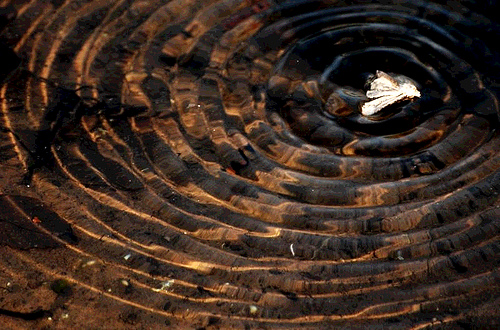We run our website the way we wished the whole internet worked: we provide high quality original content with no ads. We are funded solely by your direct support. Please consider supporting this project.
Why We Can’t Know Why Bad Things Happen
Science has demonstrated that the slightest variation in a sufficiently complex process at one point may cause remarkable variations in that process at another point. It’s called chaos theory. The flap of a butterfly wing in one part of the globe can be, under the right conditions, the deciding variable that brings about a hurricane in another part of the globe several months later. (This has been called “the butterfly effect.”) To exhaustively explain why a hurricane (or any weather pattern, for that matter) occurs when and where it does, we’d have to know every detail about the past history of the earth—including every flap of every butterfly wing. Of course, we can’t ever approximate this kind of knowledge, which is why weather forecasting will always involve a significant degree of guesswork.
By analogy, this insight may be applied to free decisions. Because love requires choice, humans and angels have the power to affect others for better or worse. Indeed, every decision we make affects other agents in some measure. Sometimes the short-term effects of our choices are apparent, as in the way the decisions of parents immediately affect their children or the way decisions of leaders immediately affect their subjects. The long-term effects of our decisions are not always obvious, however. They are like ripples created by a rock thrown into a pond. Ripples endure long after the initial splash, and they interact with other ripples (the consequences of other decisions) in ways we could never have anticipated. And in certain circumstances, they may have a “butterfly effect.” They may be the decisive variable that produces significant changes in the pond.
Each person influences history by using his or her morally responsible say-so, creating ripples that affect other agents. And as the originators and ultimate explanations for their own decisions, individuals bear primary responsibility for the ripples they create. Yet each individual is also influenced by the whole. Decisions others have made affect their lives, and these people were themselves influenced by decisions others made. In this sense every event is an interference pattern of converging ripples extending back to Adam, and each decision we make influences the overall interference pattern that affects subsequent individuals.
From this it should be clear that to explain in any exhaustive sense why a particular event took place just the way it did, we would have to know the entire history of the universe. Had any agent, angelic or human, made a different decision, the world would be a slightly different—or perhaps significantly different—place. But we, of course, can never know more than an infinitesimally small fraction of these previous decisions, let alone why these agents chose the way they did. Add to this our massive ignorance of most natural events in history—which also create their own ripples—combined with our ignorance of foundational physical and spiritual laws of the cosmos, and we begin to see why we experience life as mostly ambiguous and highly arbitrary. We are the heirs to an incomprehensibly vast array of human, angelic, and natural ripples throughout history about which we know next to nothing but which nevertheless significantly affect our lives.
When all is said and done, the mystery of why any particular misfortune befalls one person rather than another is not different than the mystery of why any particular event happens the way it does. Every particular thing we think we understand in creation is engulfed in an infinite sea of mystery we can’t understand. The mystery of the particularity of evil is simply one manifestation of the mystery of every particular thing.
—Adapted from Is God to Blame? pages 97-99
Category: General
Tags: Chaos Theory, Is God to Blame?, Problem of Evil, Suffering, The Butterfly Effect, Variables
Topics: The Problem of Evil
Related Reading

Baby Universalism and Reasonable Infanticide
Here’s a perfectly random brain stimulator: In contemporary western Christianity it is almost universally assumed that deceased babies automatically go to heaven. I call this the doctrine of “baby universalism” (similar to “canine universalism” = “all dogs go to heaven”). There are a few scriptural passages that can be used to support this perspective (e.g.…

Why Compatibilistic Freedom Does Not Make Sense
Compatibilism is the view that free will is compatible with determinism. In this view, freedom is defined as the ability to do what you want, though what you want is determined by factors outside of you. Theologians who espouse this perspective, hold that God ultimately determines what individuals want. This is in contrast to “self-determining…

The Risk of Love & the Source of Evil
On Sunday Greg tweeted the following: Love IS a tremendous risk. But if humans ever concluded the risk was not worth it, we likely become extinct rather quickly. … Yes, love is risky. It costs us everything, and we sometimes get terribly hurt. But it’s this risk that “makes the world go round.” … And…

A Cross-Centered Evaluation of Responses to Tragedy
I’d like to pick up where I left off on my previous post about Draper’s article entitled “Aurora shooting inspires various perspectives on God and belief.” Toward the end of his article, Draper reports on an informal survey conducted by Stephen Prothero on his CNN Blog. Prothero simply asks people to respond to the question: “Where…

Are we called to suffering?
What does it mean when we say we’re called to suffering? Does it mean that we should allow ourselves to be victimized or that God approves when we are abused? Here are Greg’s thoughts on this topic.

Is Suffering Part of God’s Secret Plan?
In the Christian tradition since Augustine, the most common explanation for the apparent arbitrariness of life and God’s interaction with humanity has been God’s mysterious will—his “secret plan,” as Calvin says. Whether or not a child is born healthy or a wife is killed by an intruder is ultimately decided by God. If we ask…

